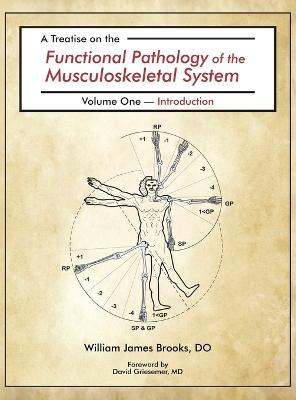A Treatise on the Functional Pathology of the Musculoskeletal System: Volume 1: Introduction

A Treatise on the Functional Pathology of the Musculoskeletal System: Volume 1: Introduction
In this Treatise on the Functional Pathology of the Musculoskeletal System (FPMSS), Dr Brooks presents a new paradigm for understanding the musculoskeletal system and a scientifically valid-reliable, semiquantifiable, and consistently interpretable-method for examining dysfunction thereof. This first volume presents the fundamentals of the paradigm and is designed for use by a primary care audience. While the paradigm is applicable to the wide variety of clinical conditions potentially amenable to manual medicine and related rehabilitative techniques, this first volume takes chronic, nonspecific musculoskeletal pain syndromes as its focus for application.
The FPMSS paradigm complements orthopedic, rheumatologic, and neurologic understandings of the musculoskeletal system and contrasts with current models of manual medicine in several important respects:
- Understands the musculoskeletal system (MSS) as an integrated organ system
- Discriminates questions about physiology from questions about anatomy
- Discriminates questions about pathology from questions about physiology
- Differentiates functional pathology from structural pathology
- Appreciates principles of scientifically valid nomenclature for function and dysfunction of musculoskeletal structures as components of an integrated system
- Recognizes dysfunction of the musculoskeletal system as inefficient function
- Shifts the emphasis of examination for dysfunction from malalignment of structure/posture to disturbance of systemic movement
- Discriminates control of posture and movement from imbalance of available motion
- Grades available motion deficits using the criterion of proportionality-not merely symmetry-thus revealing otherwise unappreciated dysfunction and allowing for prioritization and profiling
- Prioritizes mobilization interventions according to specified, ranked criteria
- Profiles an individual's motion phenotype based upon patterns of available motion deficits, thus providing "precision" biomechanical medicine
Use of the FPMSS paradigm examination will reduce the incidence of false negative and false positive findings for MSS dysfunction-thus improving the effectiveness, safety, and efficiency of caring for those suffering from chronic musculoskeletal pain.
PRP: 725.16 Lei
Acesta este Pretul Recomandat de Producator. Pretul de vanzare al produsului este afisat mai jos.
652.64Lei
652.64Lei
725.16 LeiLivrare in 2-4 saptamani
Descrierea produsului
In this Treatise on the Functional Pathology of the Musculoskeletal System (FPMSS), Dr Brooks presents a new paradigm for understanding the musculoskeletal system and a scientifically valid-reliable, semiquantifiable, and consistently interpretable-method for examining dysfunction thereof. This first volume presents the fundamentals of the paradigm and is designed for use by a primary care audience. While the paradigm is applicable to the wide variety of clinical conditions potentially amenable to manual medicine and related rehabilitative techniques, this first volume takes chronic, nonspecific musculoskeletal pain syndromes as its focus for application.
The FPMSS paradigm complements orthopedic, rheumatologic, and neurologic understandings of the musculoskeletal system and contrasts with current models of manual medicine in several important respects:
- Understands the musculoskeletal system (MSS) as an integrated organ system
- Discriminates questions about physiology from questions about anatomy
- Discriminates questions about pathology from questions about physiology
- Differentiates functional pathology from structural pathology
- Appreciates principles of scientifically valid nomenclature for function and dysfunction of musculoskeletal structures as components of an integrated system
- Recognizes dysfunction of the musculoskeletal system as inefficient function
- Shifts the emphasis of examination for dysfunction from malalignment of structure/posture to disturbance of systemic movement
- Discriminates control of posture and movement from imbalance of available motion
- Grades available motion deficits using the criterion of proportionality-not merely symmetry-thus revealing otherwise unappreciated dysfunction and allowing for prioritization and profiling
- Prioritizes mobilization interventions according to specified, ranked criteria
- Profiles an individual's motion phenotype based upon patterns of available motion deficits, thus providing "precision" biomechanical medicine
Use of the FPMSS paradigm examination will reduce the incidence of false negative and false positive findings for MSS dysfunction-thus improving the effectiveness, safety, and efficiency of caring for those suffering from chronic musculoskeletal pain.
Detaliile produsului









